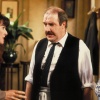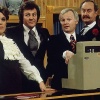I’m not sure what the most dreamy thing about television heartthrob Richard O’Sullivan was (and I’m not being sarcastic – I remember having a bit of a crush on him when I was glued to the television watching him as both a dashing highwayman in Dick Turpin and a put-upon father in Me and My Girl); was it the carefully coiffured hair, the slightly uneven smile that revealed a central gap in his teeth, or the open shirts that revealed his manly chest hair?
To be fair, it could have simply been his on screen charisma – if his theatre school gave lessons in gentle twinkly-eyed flirting then O’Sullivan definitely studied hard, and took all that he’d learnt with him when he stepped into the role of Robin Tripp in Man About the House.
This particular ITV sitcom was pretty risqué for the 1970, with the central plot involving an unwed man sharing a flat with two unmarried ladies. Personally I find that less controversial than some of the polyester fashion eyesores on display throughout the show’s run, but that’s just me.
So, we’ve established that Tripp was the ‘man’, but whose ‘house’ was he ‘about’? Well, the flat in question belonged to Chrissy (Paula Wilcox) and Jo (Sally Thomsett), two girls who bothed work and live together. Originally there were three flatmates, and it was during the morning after of girl three’s (or Eleanor as she was known) leaving party that the remaining pair first met Robin Tripp. I say ‘met’, but I should really use the word ‘discovered’, as when they first laid eyes on him, he was fast asleep in their bath. Once he was awakened he cooked them breakfast, and as the girls’ own culinary expertise was less than impressive, they took an immediate shine to him. He told them that he’d arrived in London from Southampton a couple of days before the party and was attending a college as a trainee chef. He was staying at the YMCA, and therefore (amazingly coincidentally) looking for a more permanent abode.
Obviously we already knew that Tripp would be moving in to the spare room (otherwise the programme would be called ‘Man who was about the house for a little while but ultimately didn’t move in’, which was far too long to put in any TV listings magazine) but firstly we had to meet Gabrielle, another contender for the space. Chrissy and Jo much prefered Robin’s cooking skills to Gabrielle’s bolshiness, and so convinced him to move in with them, albeit platonically. Despite the coy glances through his eyelashes, and continuous flirtatious remarks, neither woman was interested in any kind of romantic situation with him (the chest hair/medallion combo didn’t do it for you then girls?) and the threesome settled down to their new living arrangements.
There was a slight problem however, in the form of the landlord. The three flatmates were wise to the fact that George Roper (played by the marvellous Brian Murphy) would probably object to the mixed-sex household and because of this, told him that Robin was in fact gay. Roper bought the lie, but it didn’t get past his much cannier wife Mildred (the sublime Yootha Joyce) who continued the deception but then spent much of her time making inappropriate ‘nudge, nudge, wink, wink’ remarks to the younger man.
George and Mildred (fans of the show will also know that Murphy and Joyce went on to act in the spin-off series of that name) were the real stars of Man About the House. George was clumsy and inept, prone to believing whatever he was told (hence Tripp getting away with the gay thing by simply throwing in a few camp mannerisms every now and again) and completely under his statuesque wife’s control; he’d mutter and moan about Mildred’s constant bossiness, but would always jump when she commanded him too. Despite being intimidating and an aspiring social climber (she was often embarrassed by George’s lack of class) Mildred was immensely likeable; Joyce brought a real warmth to her larger than life character. And whilst George was (unintentionally) hilarious it was easy to see why Mildred was frustrated with her life – he wasn’t Mr Dynamic by any stretch of the imagination. He seemed to be fairly asexual, yearning for the quiet life and having no real interest in marital relations with his wife, which left himself open to some pretty acerbic put downs from her. This was probably also the reason why she often took the side of the tenants whenever George got embroiled in any kind of disagreement with them.
Curiously, for a show where much of the script was obsessed with racy retorts, not one of the characters appeared to be in any danger of getting any kind of physical interaction; George and Mildred certainly weren’t, and you got the feeling that if Chrissy and Jo could have put padlocks on any zips or other openings in their clothes they would have done, such was their prim and proper response to any of Robin’s hopeful come-ons.
The first episode of Man About the House went out on 15 August 1973 and ran for thirty nine episodes divided into six series. The last episode was shown on 7 April 1976. As seemed to be obligatory at that time, there was also a film version made in 1974 – this involved all the main cast members and did well at the cinema on release.
There were then two spin-off series, the first being the already mentioned George and Mildred, which ran for three years from 1976. It was written by the same successful team of Brian Cooke and Johnnie Mortimer, and the premise of this show was the Ropers’ move to a modern house on an upmarket estate in Hampton Wick (ooh, Hampton Wick, get them!). Their arrival was a shock to neighbour Jeffrey Fourmile (Norman Eshley, familiar to the audience already as he’d also played Robin’s brother in Man About the House) , who then worried that their uncouthness would lower the value of his house (do estate agents estimate house prices based on whether the neighbours know which knife to eat their fish course with then?). Reprising the popularity of its forerunner, George and Mildred continued for five series, with a sixth never leaving the planning stage after the news of Joyce’s untimely death.
Robin’s Nest (not to be confused with the large estate that Magnum P.I. lived on in Hawaii) was the second spin-off, written also by Cooke and Mortimer and this time featuring O’Sullivan as the new owner of a bistro. Tripp now lived in the flat above the restaurant with his girlfriend (Tessa Wyatt), a situation that needed special permission from the Independent Broadcasting Association before it could be shown on television…An unmarried couple being shown in bed together? That was only allowed if you were Morecambe and Wise. Robin’s Nest ran for six series and a couple of specials, starting in January 1977 and ending in March 1981.
Man About the House transferred very successfully to the US, broadcasting there as much-loved show ‘Three’s Company’. Spin-offs The Ropers and Three’s a Crowd fared less well, and both were cancelled after a very short run. Well, nobody could say ‘George!’ as scathingly as Joyce, so it’s not surprising really.










Do You Remember Man about the House?
Do You Remember Man about the House?